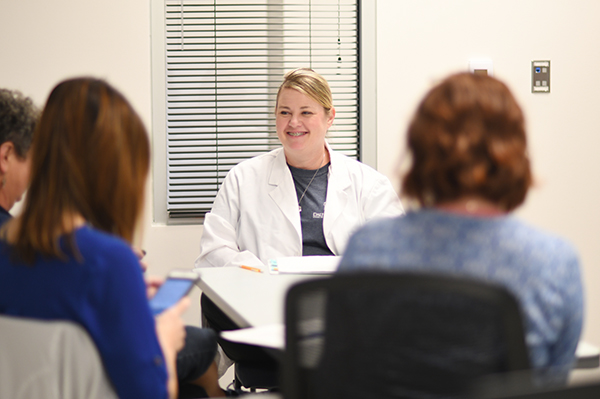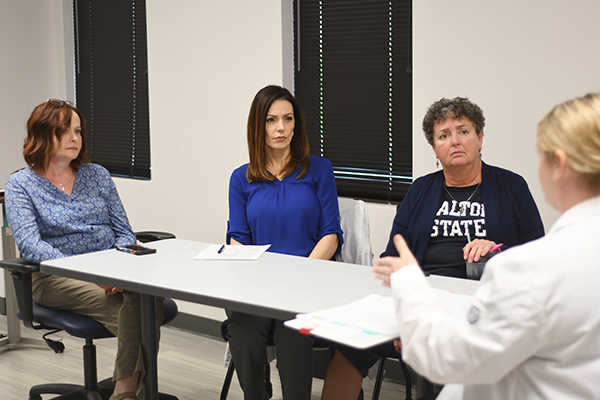News
Simulation Lab Experience Continues Virtually
04/08/20
 The nursing programs at Dalton State take a hands-on approach in teaching students the skills they need to succeed after graduation. So when programs moved to remote instruction in March to help prevent the spread of the new coronavirus (COVID-19), nursing faculty and staff got creative to ensure they were meeting students’ educational needs.
The nursing programs at Dalton State take a hands-on approach in teaching students the skills they need to succeed after graduation. So when programs moved to remote instruction in March to help prevent the spread of the new coronavirus (COVID-19), nursing faculty and staff got creative to ensure they were meeting students’ educational needs.
The simulation lab, which utilizes interactive, computerized mannequins, is an integral part of all programs in the School of Health Professions and introduces students to dire situations in a safe environment. Time spent in the sim lab counts toward required clinical hours in the nursing programs.
Nursing faculty and staff have created a virtual experience of the sim lab so students can complete clinical hours and supplement nursing skills.
“Fortunately, most of our nursing students have accomplished most, if not all, spring clinical hours,” said Dr. Sylvia Driver, chair of the Nursing Department and director of the RN to BSN program. “These virtual simulations will accomplish the same time requirements and are a supplement to what they’ve already learned and experienced in the field. Since the majority of the semester had already been completed when we moved to remote instruction, our students had already received most of their didactic learning, skills labs, simulation labs and clinical hours for the semester.
“Having a week to prepare for the move to remote instruction gave us time to develop a viable plan to prevent any educational gaps in our students’ education,” Driver said. “The only challenge we have is that a few clinicals remained for students, and they had a few proctored exams remaining. Since the program we use to prepare students to take their nursing entrance exam, NCLEX, must be proctored, we’re working to identify a way to accomplish this.”
Simulation labs have already been recorded by previous groups of students so they could review their successes and mistakes. Faculty members are using those recordings to provide a virtual experience. School of Health Professions faculty and staff are recording pre-briefing and debriefing sessions to accompany those videos.
 Students will attend five virtual sim labs that review a pediatric asthma patient in a doctor’s office, a schizophrenic patient in a hospital, a normal labor and delivery that includes birth and care of a newborn, a postpartum hemorrhage and a hypovolemic shock patient.
Students will attend five virtual sim labs that review a pediatric asthma patient in a doctor’s office, a schizophrenic patient in a hospital, a normal labor and delivery that includes birth and care of a newborn, a postpartum hemorrhage and a hypovolemic shock patient.
“The positive side of the nursing program is most of our courses are hybrid, while some courses are fully online,” Driver said. “That meant moving the remaining instruction to a virtual setting was not too difficult. More online discussion posts were added, with our first one in all courses about COVID-19. Additional assignments and quizzes were also built into courses. We have an amazing group of hard-working health professionals dedicated to help our students be successful in these challenging times.”
In addition to a virtual simulation lab, the licensed practical nursing program (LPN) is hosting live classes digitally at the time students had been meeting in person to ensure they are fulfilling requirements from the Georgia Board of Nursing.
“This not only meets our requirements, but it also allows students to see their instructor and fellow students and ask questions to get immediate feedback,” said Jennifer Parker, an assistant professor of nursing and LPN program director. “In nursing things are ever-changing, and we have to be flexible. Our students need to learn that and adapt to new experiences. I am so very proud of students’ dedication to this program and their desire to be great nurses. I am also proud of our faculty who have spent extra time and creativity to find alternative ways to meet students’ learning needs.”
Other health professional programs have adapted similarly. Social work faculty members created virtual spaces for students to conduct interviewing skills while students in field placements are able to continue with supervision, said Dr. Gina Kertulis-Tartar, dean of the School of Health Professions. Respiratory therapy students are completing in-depth research for specialized areas of care and conducting comprehensive reviews, while radiologic technology students are participating in live sessions and remotely reviewing procedures, she said.
“The faculty members in the School of Health Professions have been committed to assisting our students during this unprecedented time and learning environment,” Kertulis-Tartar said. “We are in a unique situation with many of our programs because they require traditional classroom instruction and laboratory, clinical and/or field experiences. Each program is continuing to follow the guidelines established by their boards, accrediting bodies and/or licensing agencies.
“The faculty members in health professions are incredibly passionate and dedicated to our students, our programs and healthcare,” she said. “They have not missed a step during this transition. They know if ever there were a time when we want to graduate more healthcare professionals, it is now.”
Pinning ceremonies for the nursing programs have been postponed. New dates will be announced as more information is known.
